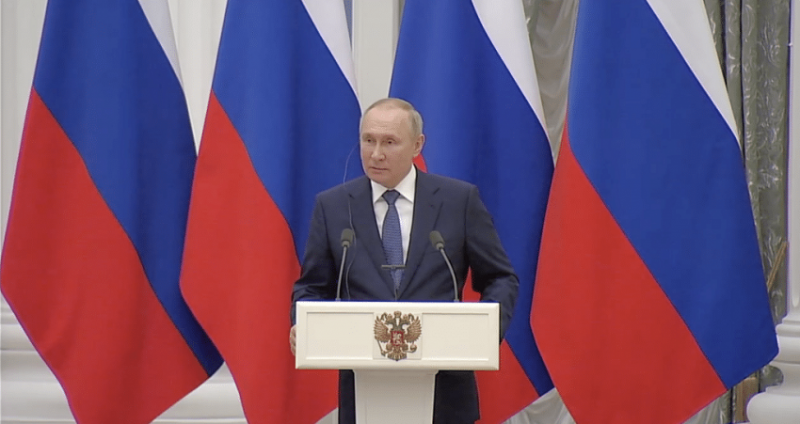
Russian President Vladimir Putin has issued a stern warning to NATO, cautioning that excessive military support for Ukraine could escalate into a nuclear conflict with Russia. Despite Russia's current military advantage in Ukraine, Putin emphasized that nuclear weapons remain an option if Russia's sovereignty and territorial integrity are threatened. Recent Russian drills with tactical nuclear weapons highlight Moscow's readiness to respond to perceived Western provocations, including discussions of deploying NATO troops in Ukraine and supplying longer-range weapons to Kyiv. This nuclear rhetoric marks a dangerous escalation amid ongoing tensions in the region.
Putin's message to NATO was clear: Excessive military support for Ukraine risks provoking a nuclear conflict with Russia. As the war in Ukraine slowly shifts in Moscow's favor, Putin asserted that nuclear weapons are not necessary for achieving Russia's goals. However, he warned that it is wrong for the West to assume Russia would never use them.
In June, Putin stated, "It mustn't be treated in a light, superficial way," reaffirming that Russia's nuclear doctrine allows for the use of atomic weapons if there is a perceived threat to its sovereignty and territorial integrity. This nuclear messaging comes as NATO allies increase support for Ukraine's depleted and outgunned forces, signaling a potentially dangerous phase in the war.
Russia has conducted drills with its tactical nuclear weapons in southern Russia and with its ally Belarus, where some were deployed in 2023. These exercises, shown in Russian Defense Ministry videos, featured Iskander missile launchers, nuclear-capable warplanes, and sea-launched missiles. The Kremlin described these drills as a response to Western considerations of deploying NATO troops to Ukraine and allowing Kyiv to use longer-range weapons for limited strikes on Russian territory.
"Reliance on nuclear threats and signals is an enduring trend in Russia's activities amid the war in Ukraine," said Heather Williams, senior fellow at the Washington-based Center for Strategic and International Studies. She suggested that Russian leadership might believe it has more at stake in Ukraine than NATO and uses nuclear threats to signal its commitment to winning the war, hoping to deter Western intervention.
Since the invasion on February 24, 2022, Putin has repeatedly referenced Russia's nuclear capability to discourage Western involvement. Despite criticism from the United States and NATO regarding this nuclear saber-rattling, they have not observed any changes in Russia's nuclear posture that would require a response.
After initial setbacks in Ukraine, Putin declared that Moscow was prepared to use "all means" to protect Russian territory, raising fears he might resort to tactical nuclear weapons to halt Kyiv's advances. However, after Ukraine's 2023 counteroffensive failed to achieve its goals, Putin toned down his rhetoric. Despite recent military successes, Putin maintained that Moscow doesn't need nuclear weapons to win in Ukraine, while warning that Kyiv's strikes on Russian soil with Western-supplied longer-range weapons would mark a significant escalation involving Western intelligence and military personnel, something the West denies.
Putin cautioned NATO members, particularly those in smaller European countries, that relying on U.S. protection could be misguided if Russia strikes them. "The constant escalation could lead to grave consequences," he said, questioning how the U.S. would respond in the face of strategic parity with Russia.
In May, Ukrainian drones attacked Russian radar facilities, damaging a radar in the southern Krasnodar region and targeting another in the southern Urals. These radars are part of Russia's early warning system for spotting intercontinental ballistic missile launches. Along with previous Ukrainian raids on Russian nuclear-capable bomber bases, these strikes could trigger atomic weapons use under Moscow's nuclear doctrine.
At a June forum in St. Petersburg, Kremlin-connected foreign policy expert Sergei Karaganov urged Putin to "aim a nuclear pistol at our Western adversaries" to achieve victory in Ukraine. Putin responded cautiously, indicating no immediate security threats warranting nuclear arsenal use but suggesting possible changes in Russia's nuclear doctrine.
Since the war's onset, hawks have advocated for a revision of the doctrine, which currently states that Moscow could use nuclear weapons in response to a nuclear strike or a conventional attack threatening "the very existence" of the Russian state. Some argue this threshold is too high, giving the West the impression that the Kremlin would never use its nuclear arsenal. Foreign affairs analyst Dmitri Trenin of the Institute of World Economy and International Relations urged modifying the doctrine to allow for nuclear weapon use when "core national interests are at stake," like in Ukraine.
With the West enabling Ukraine to hit Russian territory, Putin threatened to respond by providing weapons to Western adversaries worldwide. In June, he underscored this by signing a mutual defense pact with North Korea, signaling potential arms deliveries to Pyongyang. Additionally, Moscow plans to produce intermediate-range missiles banned under a Cold War-era pact scrapped in 2019. These nuclear-capable missiles are particularly destabilizing due to their rapid reach, increasing the likelihood of a global nuclear war over a false launch warning.
Hawks urged Putin to escalate quickly to force the West to back off. Potential moves include cyberattacks on U.S. and European infrastructure, conventional strikes on Western troops if any go to Ukraine, and attacks on military supply hubs for Kyiv on NATO territory. U.S. military bases could also be targeted.
At the top of the escalation ladder, Russia could threaten nuclear strikes on NATO targets in Europe to force negotiations. "Active nuclear deterrence means the possibility of using nuclear weapons first in the ongoing conflict - not necessarily on the battlefield and not on the territory of Ukraine," Trenin said. "The enemy must have no doubt: Russia won't allow itself to be defeated or blocked from achieving its declared goals by keeping nuclear weapons out of the conflict."